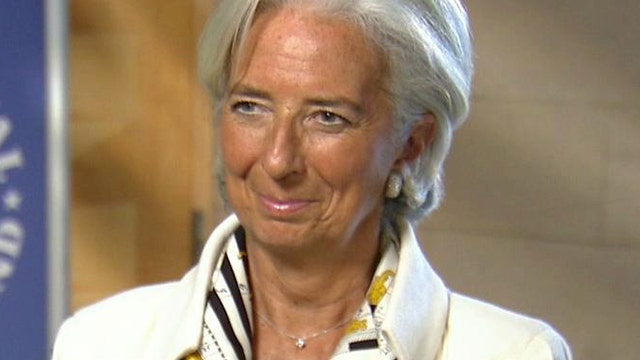IMF's Lagarde: Recovery Could Be Better, Sequestration Will Hold Back Growth
International Monetary Fund Director Christine Lagarde on Friday told FOX Business that while the U.S. economy is recovering, partly with the help of the Fed's Quantitative Easing, growth could be stronger, particularly if sequestration hadn't occurred the way it did.
Breaking down the latest IMF report on the U.S. economy in an exclusive interview with FBN's Liz Claman, Lagarde said, "We forecast the U.S. economy (growing) at 1.9% in 2013 and we believe that because of the housing market's significant improvement, in particular, there will be a more durable recovery. Yet it could be better and clearly the unemployment numbers are not where they should be."
For 2014, the IMF is forecasting growth of 2.7%, however, that's a downgrade from an earlier forecast of 3%. "When we forecasted 3%, we had assumed that sequestration will gradually be removed and reformatted more intelligently," Lagarde said, explaining the pullback. "We feel that we are not going to see that in the near term, which is why we believe that sequestration will actually impact growth in the United States in 2014."
Asked to elaborate on the IMF's view of the sequestration, Lagarde said the organization believes the U.S. should "slow down, but hurry up."
"There's no need to contract the deficit by 2.5%; it's very heavy on growth and it really impacts by about 1.5%, maybe a little bit more, particularly if it picks up in the second quarter of 2013," she said. "We're also saying hurry up because there are long-term measures that will be critical for the U.S. economy that need to be taken now, particularly concerning entitlements."
While Americans have lost jobs and cuts to government programs in areas like health care and education have impacted some, the economy, thus far, has not fallen back into recession, Stephen Fuller of George Mason University’s School of Public policy told FOX Business. They're also not likely to be replaced with a "grand bargain" between both parties in the near future.
Lagarde has met with both the Federal Reserve and the U.S. Treasury over the housing recovery, but worries about weakening loan standards. While the Fed has been pumping lots of liquidity into the economy through very low interest rates and also through massive bond-buying, there's been talk of tapering that off. The IMF believes the QE3 program will continue through the end of the year.
"Our assumptions are that there will be a continuation of that quantitative easing of the Fed until the end of 2013. We believe it was appropriate, it's been very helpful, and we hope that it continues until the end of 2013, given the circumstances," Lagarde explained. "2014, depending on circumstances, and particularly if unemployment improves and if inflation is slightly heading up a little bit, then hopefully the monetary policy that has been put in place will gradually unwind over time with good communication."




















